中国古典名著翻译
四大名著的英语翻译题

四大名著的英语翻译题六级翻译原文中国的四大名著(the Four Great Classical Novels)指创作于明清时期的四部最伟大、最有影响力的小说。
阅读四大名著,可以了解中国传统的社会、历史、地理、民俗和处世哲学。
大多数的中国人对这四部小说中的人物、情节和场景都很熟悉。
它们已经深深地影响了中国人的思想(mentality)、观念和价值观。
现在,四部小说都已被改编成电影或电视剧(TV series),受到很多观众的喜爱。
四大名著都具有很高的艺术水平,是中华民族的宝贵遗产,在中国文学史上也是一大创举。
六级参考翻译:The Four Great Classical Novels of China refer to thefour greatest and most influential novels written inthe Ming and Qing Dynasties. Reading them canacquaint people with traditional Chinese society,history, geography, folk customs and philosophy oflife. Most Chinese are pretty familiar with the figures, plots and scenes in the four novels. Theyhave profoundly influenced the mentality, ideas and values of Chinese people. Nowadays, thefour novels have already been adapted into movies or TV series, favored by lots of audiences.Being high in artistic standard, the Four Great Classical Novels are precious heritages ofChinese nation and pioneering works in the history of Chinese literature.英语四六级翻译中国特色词汇:四大名著《三国演义》 Three Kingdoms《西游记》 Journey to the West; Pilgrimage to the West《水浒传》 Heroes of the Marshes; Tales of the Water Margin《红楼梦》 Dream of the Red Mansions【三国演义翻译原文】《三国演义》写于14世纪,是中国著名的历史小说。
四大名著的英语翻译题
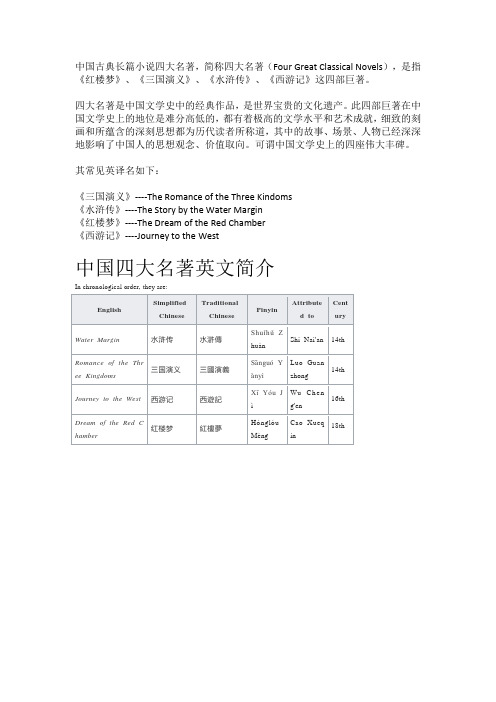
中国古典长篇小说四大名著,简称四大名著(Four Great Classical Novels),是指《红楼梦》、《三国演义》、《水浒传》、《西游记》这四部巨著。
四大名著是中国文学史中的经典作品,是世界宝贵的文化遗产。
此四部巨著在中国文学史上的地位是难分高低的,都有着极高的文学水平和艺术成就,细致的刻画和所蕴含的深刻思想都为历代读者所称道,其中的故事、场景、人物已经深深地影响了中国人的思想观念、价值取向。
可谓中国文学史上的四座伟大丰碑。
其常见英译名如下:《三国演义》----The Romance of the Three Kindoms《水浒传》----The Story by the Water Margin《红楼梦》----The Dream of the Red Chamber《西游记》----Journey to the West中国四大名著英文简介红楼梦 The Dream of the Red ChamberDream of the Red Chamber, also called The Story of the Stone, composed by Cao Xueqin, is one ofChina's Four Great Classical Novels. It was written sometime in the middle of the 18th century duringthe Qing Dynasty. Long considered a masterpiece of Chinese literature, the novel is generallyacknowledged to be the pinnacle of Chinese fiction. "Redology" is the field of study devoted exclusively tothis work.The title has also been translated as Red Chamber Dream and A Dream of Red Mansions. The novelcirculated in manuscript copies with various titles until its print publication, in 1791. Gao E, who preparedthe first and second printed editions with his partner Cheng Weiyuan in 1791–2, added 40 additionalchapters to complete the novel.Red Chamber is believed to be semi-autobiographical, mirroring the rise and decline of author CaoXueqin's own family and, by extension, of the Qing Dynasty. As the author details in the first chapter, it isintended to be a memorial to the damsels he knew in his youth: friends, relatives and servants. The novel isremarkable not only for its huge cast of characters and psychological scope, but also for its precise anddetailed observation of the life and social structures typical of 18th-century Chinese society.Also called "The story of the Stone (Shitouji 石头记)", this novel written by Cao Xueqin 曹雪芹(d. 1763) is said to be the greatest masterpiece of Chinese fiction. A wide branched scholarship does not consent about the main theme of this novel, should it be a novel of sentiment, of Daoist-Buddhist enlightenment, of social observation, of the decay of an aristocratic familiy, or even a veiled attack on Manchu rule. The frame of the novel is the contest of a Buddhist and a Daoist priest who make be born a young noble boy called Jia Baoyu 贾宝玉and his girl cousin Lin Daiyu 林黛玉.With a loving detail describing the life of the two cousins in a huge noble mansion, between gardens and palaces, the red thread is the triangular love between Baoyu, Daiyu and a second girl cousin called Xue Baochai 薛宝钗that is of more plumper character than the ever sick Daiyu. Switching between their life, the divine world and dreams, Baoyu becomes deranged after the disappearance of a stone (the origin of the second title) he had in his mouth when he was born. Not knowing, his love Daiyu died, he is tricked to marrying Baochai. Becoming aware of being tricked, Baoyu leaves the world of the "red dust" and becomes a monk. With hundreds of persons and their stories, paralleling the life and feelings of servants to the life of the main persons, the story is very complex and full of symbolisms, but very interesting and convincing for its encyclopedic character, depicting the life of a noble familiy in the 18th century Q ing China.三国演义Romance of The Three KingdomsRomance of the Three Kingdoms is a 14th-century historical novel attributed to Luo Guanzhong. It is setin the turbulent years towards the end of the Han dynasty and the Three Kingdoms period in Chinesehistory, starting in 169 AD and ending with the reunification of the land in 280.The story – part historical, part legend, and part mythical – romanticises and dramatises the lives of feudallords and their retainers, who tried to replace the dwindling Han dynasty or restore it. While the novelfollows hundreds of characters, the focus is mainly on the three power blocs that emerged from theremnants of the Han dynasty, and would eventually form the three states of Cao Wei, Shu Han, and EasternWu. The novel deals with the plots, personal and military battles, intrigues, and struggles of these states toachieve dominance for almost 100 years.Romance of the Three Kingdoms is acclaimed as one of the Four Great Classical Novels of Chineseliterature; it has a total of 800,000 words and nearly a thousand dramatic characters (mostly historical) in120 chapters. The novel is among the most beloved works of literature in East Asia, and its literaryinfluence in the region has been compared to that of the works of Shakespeare on English literature. It isarguably the most widely read historical novel in late imperial and modern China.Romance of The Three Kingdoms is one of the great chinese classics and is compiled into a semi-fictional literary masterpiece during the Ming Dynasty by Luo Guanzhong. The novel comprises around 70+% fact and 20+% fiction. Some issues such as Guan Yu's weapon weighing around 40+ kilograms, the capabilties of Lu Bu, Liu Bei's horses as well as the existence of the Hill of the Fallen Phoenix and some others are probably fictional.That period in history can be said as the golden age of chivalry and although it happened more than 1700 years ago, characters such as Liu Bei, Cao Cao, Guan Yu, Zhang Fei and Zhuge Liang have become household names among the chinese. Tales of their exploits, courage, adventures and many more are told in the novel "Romance of The Three Kingdoms".It is one of the most turbulent periods in China's history taking place toward the end of the Han Dynast y where corruption is rampant in the imperial court due to eunuches holding power. Coupled with natural disasters such as floods, plague and locust swarms devouring the crops grown by the peasants, hunger and disatisfaction among the peasants soon escalated rapidly until a major rebellion known as the "Yellow Scarves Rebellion" led by Zhang Jiao broke out. (It was dubbed "Yellow Scarves" because the rebels tied a yellow scarf on their head). Initially just a small band of rebels, dueto widespread hunger and ill-sentiment among the populace, swarms of common folks joined in the rebellion across many parts of the country.三国演义人物介绍刘备Liu Bei (161–223 AD), styled Xuándé (玄徳), was a general, warlord, and later the founding emperor of Shu Han during the Three Kingdoms era of China. Although having a later start than his rivals, also lacking both the material resources and social status they commanded, Liu Bei overcame his many defeats to carve out his own realm, that at its peak spanned modern day Sichuan, Guizhou, Hunan, part of Hubei, and part of Gansu.Culturally, due to the tremendously popular novel Romance of the Three Kingdoms by Luo Guanzhong, Liu Bei is widely known as the ideal benevolent, humane ruler who cared for his people and picked good advisors. His character was to advocate the Confucian set of moral values, such as loyalty and compassion.张飞Zhang Fei (?-221 AD) was a military general of Shu Han during the Three Kingdoms era of China.Zhang Fei was shown to have been a masterful general rather than simply a warrior. He treated hissuperiors with respect, but had little respect for his underlings. He was often warned by Liu Bei that hishabit of over-punishing his own soldiers by lashing and killing would eventually bring himself disaster.Zhang Fei married Xiahou Yuan's daughter, who was captured by Zhang Fei's troops as she was outgathering firewood. They had a total of two daughters, and the older daughter became the empressof Shu Han after marrying Liu Shan, with Zhuge Liang as the matchmaker. After Zhang Fei's eldestdaughter had passed away due to natural causes, Zhuge Liang once again played the role ofmatchmaker, and Liu Shan married Zhang Fei's younger daughter, who thus succeeded her oldersister to become the empress of Shu Han.Zhang Fei is best portrayed through his description and actions depicted in Records of Three Kingdomsbiography by Chen Shou. Some claim that Zhang Fei was also an excellent painter.Zhang Fei was killed by his own men Zhang Da and Fan Jiang, while preparing his troops to attack therival Eastern Wu to avenge the death of Guan Yu. Zhang Da and Fan Jiang went on to defect to Wu.水浒传Outlaws of the Marsh / Water MarginWater Margin is a Chinese novel attributed to Shi Nai'an. Considered one of the Four Great ClassicalNovels ofChinese literature, the novel is written in vernacular Chinese rather than Classical Chinese.The story, set in the Song dynasty, tells of how a group of 108 outlaws gather at Mount Liang (orLiangshan Marsh) to form a sizable army before they are eventually granted amnesty by the governmentand sent on campaigns to resist foreign invaders and suppress rebel forces. It has introduced to readersmany of the best-known characters in Chinese literature, such as Wu Song, Lin Chong and Lu Zhishen.The novel "Outlaws of the Marsh" is somewhat like the Iliad and Odyssey... An ancient epic tale... no one remembers the period it was composed and immortalized.One knows this story is based on real facts and has inspired many storytellers.One knows the North Song Dynasty (XIIIth Century) lived its apogee and declined, a victim of corruption and decadence.One finds historical traces of these outlaws who challenged the imperial authority and died under the executioner's blade.At last, as anyone knows today that a man called Homer wrote the Iliad and Odyssey, no one doubts anymore that a man called Shi Nai-an wrote down during the XIVth century the novel Outlaws of the Marsh that reached us.Everyone recognizes that Jin Sheng-tan, during the XVIIth century, published what is now famous as the original version of a novel that obtained the interest and infatuation of successive generations.Water Margin or Outlaws of the Marsh ("All men are brothers" in Pearl Buck's translation, "Shui hu zhuan" in Chinese, "Au Bord de l'Eau" in French ) is an immortal novel because its tale is universal : it speaks of beings (outlaws but also notables, strong muscled heroes but also intellectual, anarchists but also philosophers...) who cannot bear injustice nor abuse nor arbitrariness...That is the reason they are immortal and their popularity has lasted for centuries .Discover the 108 heroes, the episodes , the paper-cuts representing them, the Beijing operas their fighting exploits inspired...人物Gai Ping Health gave special love make the world anyway, famous arena. Like charges to stick, chicken, and did not take wives, all hit others physique. Village Creek Village haunted legends, villagers digging a river in the town engraved art, ghost was rushed to the East seven. Classical hell, then alone will be engraved Creek Village in places away from the East side down. Thus so-called "Tota kings".晁盖平生仗义疏财,专爱结交天下好汉,闻名江湖。
《问菊》原文及翻译赏析

《问菊》原文及翻译赏析《问菊》原文及翻译赏析《问菊》是清代小说家曹雪芹所作的七言律诗,是《红楼梦》第三十八回林黛玉所作菊花诗。
首联以东篱访问秋情点题,符合了“问菊”的主题。
下面是店铺精心整理的《问菊》原文及翻译赏析,仅供参考,希望能够帮助到大家。
原文欲讯秋情众莫知,喃喃负手叩东篱。
孤标傲世偕谁隐,一样花开为底迟?圃露庭霜何寂寞,鸿归蛩病可相思?休言举世无谈者,解语何妨片语时。
古诗简介《问菊》是清代小说家曹雪芹所作的七言律诗,是《红楼梦》第三十八回林黛玉所作菊花诗。
首联以东篱访问秋情点题,符合了“问菊”的主题。
“喃喃”二字情态毕现。
颔联“孤标傲世偕谁隐”一句,俨然就是林黛玉的写照。
颈联烘托渲染菊花生长的凄清环境,“寂寞”、“相思”四字又最能点示出林黛玉的内心活动。
末联是在菊花中寻求精神寄托之意。
这首诗深沉地揭示了诗人的精神世界的,单就律诗的格律而言,这首诗是确有可推敲之处的,有的对仗不够工稳。
此诗用拟人手法视秋菊为知己并与之谈心,赞美菊花的“孤标傲世”的高洁风格,实际上也正是诗人的自我评价。
翻译想要打问秋天的消息却没有人知晓,我只好背着手轻声地询问东篱:你的品格如此孤高傲世,又有谁能够和你一同隐居,同样都是花而你为什么又开放得这么晚?落满霜露的庭院和园圃多么寂寞,鸿雁南飞蟋蟀低吟你是否相思。
且不要说整个世间没有能够和你谈论的人,你如果懂得人的话语不妨和我小叙片刻。
注释秋情:即中间两联所问到的那种思想情怀。
因“众莫知”而唯有菊可认作知己,故问之。
喃喃:不停地低声说话。
负手:把两手交放在背后,是有所思的样子。
叩:询问。
东篱:指代菊。
孤标:孤高的'品格。
标,标格。
偕:同……一起。
为底:为什么这样。
底,何。
圃露庭霜:落满霜露的园圃和庭院。
互文的修辞手法。
鸿归:大雁南飞。
蛩病:蟋蟀将要死去。
可:是不是。
雁、虱、菊都是拟人写法。
举世:整个世问,整个社会。
解语:能说话。
在这里的意思是如果花能说话的话。
拟人的修辞手法。
《水浒传》三种英文全译本的分析与比较

《水浒传》三种英文全译本的分析与比较概述作为“中国古典四大名著”之一的《水浒传》,在中国文学史上占有举足轻重的地位。
将这部名著介绍到西方世界,是东西方文化交流中一项重要的任务。
然而,《水浒传》的翻译,同样是一项困难的工作。
翻译过程中常常会出现“不可译”现象,从语言上,原语与译语在语音、词汇、语法、意义方面存在着诸多差异;从文化上,不同的语言有不同的文化背景,不同的民族在生活方式、思维方式和价值观念上差别巨大:这些对翻译工作造成了极大障碍。
而《水浒传》中许多官名、官署、武器、服装、家用器具、仪式、宗教事务、双关语、玩笑及文学的暗喻在英文里都找不到对等的词,正是令译者陷入了很多“不可译”的尴尬境地。
除此之外,经考证,《水浒传》的作者“施耐庵与罗贯中常把它们自己的江苏方言让书中的山东角色说出来,他们把十四世纪的服装、武器、政府机构强加到生活在十二世纪的人们身上。
城镇的位置常搞错,时间的顺序也常是乱的。
”这也给翻译工作造成了很多困难。
目前,《水浒传》有很多英文译作,但只有三个译本真正将前七十回完整译出:Water Margin(1937),英国人J. H. Jackson(杰克逊)翻译All Men Are Brothers(1933),美国人Pearl S. Buck(赛珍珠)翻译Outlaws Of The Marsh(1960),中国籍美国人Sidney Shapiro(沙博理)翻译。
在西方社会中,流传最广,影响最大的,是赛珍珠的译本(以下简称赛译),而一部分学者认为赛译是三个译本中最好的。
如中国水浒学会常务副会长张国光(“赛珍珠且因翻译进本驰名世界文坛获诺贝尔文学奖金。
鲁迅有信说:布克夫人译《水浒》…闻颇好!‟也就包含有既赞译文又肯定原本之意。
”①)但赛译和杰克逊的译本(以下简称杰译)中存在着很多文化上的(可避免的或不可避免的)翻译错误,近年来学界普遍认为最新的沙博理的译本(以下简称沙译)为最佳。
中国古典名著翻译

中国古典名著翻译Chinese English(一)春秋时代《诗经》The Book of Songs《尚书》Classic of History; The Book of Documents《礼记》The Book of Rites 《易经》The Book of Changes 《春秋》Spring and Autumn Annals 《乐》The Classic of Music 《论语》The Analects of Confucius The Analects《孟子》Mencius《大学》The Great Learning 《中庸》The Doctrine of the Mean《左传》Zuo Zhuan ;Chronicle of Zuo;Commentary of Zuo;Zuo Tradition (二)战国时代《老子》(又名《道德经》)The Tao Te Ching;Daodejing;Dao De Jing《列子》Liezi《愚公移山》Fiaith will move mountains; How Yukong Moved Mountains 《庄子》The Zhuangzi 《荀子》The Xun-Zi 《韩非子》The Hanfeizi《吕氏春秋》The Lüshi Chunqiu;Mister Lv's Spring and Autumn Annals;Lv's Spring and Autumn;《离骚》Encountering Sorrow ; Encountering Trouble《战国策》Strategies of the Warring States 《孙子兵法》The Art of War(三)两汉《过秦论》T en Crimes of Qin; The Faults of Qin《鸿门宴》White Vengeance《毛遂自荐》Mao Sui Recommends Himself; Recommend oneself for a position as Mao Sui Did《史记》The Records of the Grand Historian ( Shi Ji)Historical Records《资治通鉴》Partial Draft of the Comprehensive Mirror to Aid in Government;The Zizhi Tongjian《汉书》The Book of Han;Hanshu; History of the Former Han《后汉书》The Book of Later Han;Hou Hanshu; History of the Later Han《三国志》Records of the Three Kingdoms《陌上桑》Mulberry By Road; The Roadside Mulberry《长歌行》Singing All Along;A slow Song《十五从军征》The Old Soldier's Return《孔雀东南飞》A Pair of Peacocks Southeast Fly; The Peacocks Fly to the South and the East《上邪》The Pledge(四)三国两晋南北朝《短歌行》Short Song Style;A short Song《观沧海》The Sea《七步诗》The Quatrain of Seven Steps; Written While Taking Seven《洛神赋》The Goddess of the Luo 《出师表》Memorial on Going to War 《搜神记》Sou Shen Ji《桃花源记》The Peach Blossom Spring; The Peach Blossom Land; Peach Blossom Spring Story《归去来兮辞》Home-going-and-coming Song《归园田居》Returning to My Farm;Return to Nature《饮酒》Drinking Wine《世说新语》A New Account of the T ales of the World;Essays and Criticism《木兰诗》The Ballad of Mulan; The Mulan Ballad;Song of Mulan《乐府诗集》A Collection of Yue Fu Poetry;Yuefu Poetry(五)元《窦娥冤》The Injustice to Dou E;Snow in Summer《西厢记》The Romance of the Western Bower; The Story of the Western Wing (Wang Shifu)《赵氏孤儿》Zhao the Orphan;《天净沙·秋思》翁显良:Autumn; Schlepp: Tune to ”Sand and Sky”- AutumnThoughts;丁祖馨& Burton: Tune: Tian Jing Sha;许渊冲:Autumn Thoughts (六)明《忠义水游传》简称《水浒》Water Margin; Outlaws of the Marsh; All men are brothers 《三国演义》Traditional Chinese;Simplified Chinese;The Romance of the Three Kingdoms《西游记》Journey to the West;Monkey King;Journey to the West Pilgrimage to the West;Story of the Journey to the West《金瓶梅》The Forbidden Legend Sex & Chopsticks;The Plum in the Golden Vase;The Golden Lotus;Chin P’ing Mei《牡丹亭》The Peony Pavilion《喻世明言》Clear Words to Illustrate the World;Stories to Enlighten Men《醒世恒言》lasting words to awaken the world;Stories to Awaken Men《警世通言》ordinary words to warn the world;Stories to Warn Men《初刻拍案惊奇》Amazing Tales-First Series; 《二刻拍案惊奇》Amazing Tales- Second Series(七)清《聊斋志异》Traditional Chinese; Strange Stories from a Chinese Studio《儒林外史》The Scholars (novel)《红楼梦》Dream of the Red Chamber;The Story of the Stone《己亥杂诗》Ji Hai Poem of Feeling《官场现形记》A Revelation of Official Circles Exposure of the Official World。
菊梦原文赏析及翻译[共5篇]
![菊梦原文赏析及翻译[共5篇]](https://img.taocdn.com/s3/m/03d586300a4e767f5acfa1c7aa00b52acfc79cee.png)
菊梦原文赏析及翻译[共5篇]第一篇:菊梦原文赏析及翻译菊梦原文赏析及翻译3篇菊梦原文赏析及翻译1原文菊梦清代曹雪芹篱畔秋酣一觉清,和云伴月不分明。
登仙非慕庄生蝶,忆旧还寻陶令盟。
睡去依依随雁断,惊回故故恼蛩鸣。
醒时幽怨同谁诉,衰草寒烟无限情。
译文东篱的菊花下,酣梦一觉方醒,只觉得天上的云与月混在一起,还看不分明。
如此花下飘飘欲仙的酣眠,不是为了追寻庄子梦蝶的感觉,只是为回忆陶渊明爱菊、赏菊的风雅。
睡去以后,心思随着南归的大雁远去,美梦却被蟋蟀的鸣叫声每每惊醒。
醒来以后,我的幽怨还能找谁去诉说?只有把无限的情思寄托于衰草寒烟。
注释秋酣一觉清:秋菊酣睡,梦境清幽。
“和云”句:唐代张贲以“和霜伴月”写菊,兹换一字,以写菊花梦魂高飞;以“不分明”说梦境依稀恍惚。
⑶登仙”句:说梦魂翩跹,仿佛成仙,但并非是羡慕庄子变作蝴蝶。
庄周梦中化蝶事见《庄子·齐物论》。
这里引“庄生蝶”是为了点“梦”。
忆旧:实即“梦旧”,诗题中“梦”字句中不出现是咏物诗技巧上的讲究。
寻盟:表示结交友好,语出《左传》。
这一联构思或受元代柯九思“蝶化人间梦,鸥寻海上盟”诗句的启发。
故故:屡屡,时时。
赏析此诗是写菊花之梦,也是写咏菊者之梦。
因写梦境,故用扑朔迷离的笔法。
菊花在酣梦中进入和云伴月的佳境,去寻高朋结良盟。
但这种美妙的境界常被打断,因之产生种种懊恼和幽怨。
因为林黛玉的孤傲是做出来给人看的,因此她的《菊梦》和《咏菊》《问菊》一样,也比较扭曲:“登仙非慕庄生蝶,忆旧还寻陶令盟”。
她做这个梦,不是为了羡慕庄周人与自然合为一体的纯然感觉,只是为了效仿陶渊明,作一作能博取美名的清高秀。
总而言之,林黛玉的清高正如这些菊花诗一样,是刻意装出来的。
是在明知“一从陶令平章后,千古高风说到今”的情形下,而刻意效仿出来的。
目的只是为了抒发自己小文人式的对世俗名位的求之不得的哀怨,并同时博取清高的美名和旁人的同情。
因此,一遇到真正能考验她能够取法陶令的时候,她就丢下这些“孤标傲世偕谁隐”、“满纸自怜题素怨”的标榜而不管,一个劲地去高歌“何幸邀恩宠,宫车过往频”、“盛世无饥馁,何须耕织忙”、“主人指示风雷动,鳌背三山独立名”了。
中国古典特色文化翻译实例总结
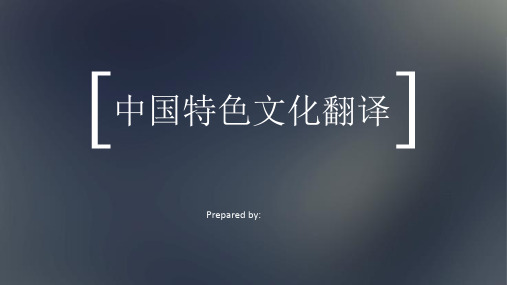
经典中文的英语表达: 但愿人长久,千里共婵娟 We wish each other a long life so as to share the beauty of this graceful moonlight,even though miles apart. 海内存知己,天涯若比邻 A bosom[ˈbʊzəm] friend(知心好友)afar brings distance near.
potalapalace布达拉宫largeleshanbuddha乐山大佛huangshanmountain黄山dongtinglake洞庭湖shaolintemple少林寺snakehilleastlake东湖westlake西湖peoplesgreathall人民大会堂summerpalace颐和园bundb?nd外滩上海外滩shanghaibunddr
中国四大名著: 红楼梦:The Story of the Stone 三国演义:The Roamnce of the Three Kingdoms 西游记:Journey to the West 水浒传:Heroes of the Marshes[mɑ:ʃ]沼泽
传统文化词语: 京剧:Peking Opera 炎黄子孙:Chinese descent [dɪˈsent] 血统 五行:five elements 美猴王:Handsome Monkey King
Snake Hill 蛇山 East Lake 东湖 WestLake 西湖 People‘s Great Hall 人民大会堂 the Summer Palace 颐和园 the Bund [bʌnd] 外滩 上海外滩 Shanghai Bund Dr. SunYet-sen’s Mausoleum [ˌmɔ:səˈli:əm] the Forbidden City 紫禁城
四大名著的英语翻译题
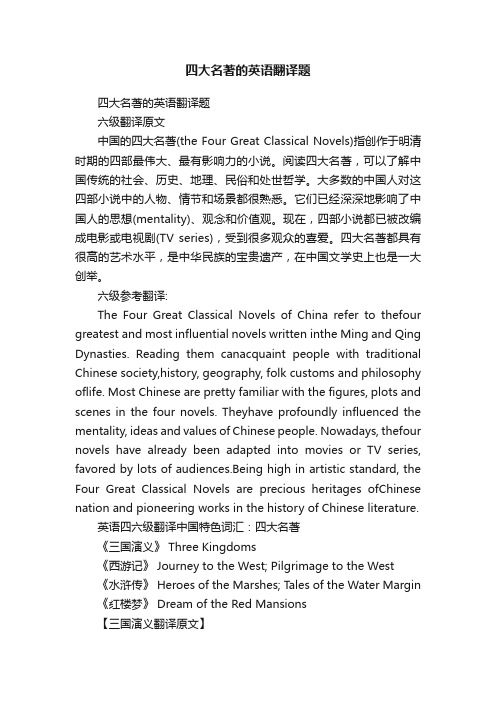
四大名著的英语翻译题四大名著的英语翻译题六级翻译原文中国的四大名著(the Four Great Classical Novels)指创作于明清时期的四部最伟大、最有影响力的小说。
阅读四大名著,可以了解中国传统的社会、历史、地理、民俗和处世哲学。
大多数的中国人对这四部小说中的人物、情节和场景都很熟悉。
它们已经深深地影响了中国人的思想(mentality)、观念和价值观。
现在,四部小说都已被改编成电影或电视剧(TV series),受到很多观众的喜爱。
四大名著都具有很高的艺术水平,是中华民族的宝贵遗产,在中国文学史上也是一大创举。
六级参考翻译:The Four Great Classical Novels of China refer to thefour greatest and most influential novels written inthe Ming and Qing Dynasties. Reading them canacquaint people with traditional Chinese society,history, geography, folk customs and philosophy oflife. Most Chinese are pretty familiar with the figures, plots and scenes in the four novels. Theyhave profoundly influenced the mentality, ideas and values of Chinese people. Nowadays, thefour novels have already been adapted into movies or TV series, favored by lots of audiences.Being high in artistic standard, the Four Great Classical Novels are precious heritages ofChinese nation and pioneering works in the history of Chinese literature.英语四六级翻译中国特色词汇:四大名著《三国演义》 Three Kingdoms《西游记》 Journey to the West; Pilgrimage to the West《水浒传》 Heroes of the Marshes; Tales of the Water Margin 《红楼梦》 Dream of the Red Mansions【三国演义翻译原文】《三国演义》写于14世纪,是中国著名的历史小说。
四大名著外文译名副本

四大名著的外文译名(一)我国文学史上的“四大名著”,包括:元末明初施耐庵的《水浒传》、明初罗贯中的《三国演义》、明代吴承恩的《西游记》、清代曹雪芹的《红楼梦》。
这四部古典长篇小说,是我国古代小说的巅峰之作,其对中国文学乃至文化的影响非常深远。
四大名著影响国人的同时,也逐渐走出国门。
通过翻译,四大名著被更多的人所了解和喜爱。
那么,它们在其它国家中叫什么名字呢?这或多或少会让人好奇。
1.《水浒传》《水浒传》成书于元末明初,17世纪时就已经传入朝鲜半岛和日本。
在江户时代的日本,《水浒传》的日文译本已经有十多种。
由于日文和汉语具有亲缘关系,所以书的名字没有变,仍是沿袭中国的书名。
后来,《水浒传》有了英文、法文、德文、意大利文等版本,书名开始变得千奇百怪。
英文版的题目有:《Outlaws of the Marsh》(沼泽里的歹徒/ 法外人),附带地说一说,英文语境中最著名的法外人可能就是罗宾汉,而中国很多读者也认为《罗宾汉》是中国的《水浒传》;《All Men are Brothers——Blood of the Leopard》(四海之内皆兄弟——猎豹的血),这是上个世纪30年代赛珍珠翻译《水浒传》时译的书名,虽然有点长,但译出了“聚义”的意思,“猎豹”点出了梁山好汉的不驯服不合作(不包括后来的接受招安),“血”则直接赋予了《水浒传》悲剧的意味——虽然很多读者不认为《水浒传》是一部悲剧;另有一个译成《Water Margin》,直译,优点当然是直白了,不过味道却不是很够。
其它文本的译名也很有意思。
在法文中,《水浒传》被译作《中国的勇士》或《沼泽地区的英雄们》,另有一个比较搞笑,居然是《一百零五个男人和三个女人在山上的故事》;德文译名则有点牵强,曰《强盗与士兵》。
另外还有一些节译本的名字则与现在的知音体差不多,如德人节译潘金莲和武大郎的章节成书,书名叫《卖大饼的武大郎和不忠实妇人的故事》,节译“智取生辰纲”则起名《强盗设置的圈套》,可谓耸人听闻。
中国古代四大名著英语作文

中国古代四大名著英语作文The Four Great Classical Novels of Chinese literature, also known as the Four Great Classical Novels of China, are four novels commonly regarded by Chinese literary criticism to be the greatest and most influential of pre-modern Chinese fiction. They are Romance of the Three Kingdoms, Water Margin, Journey to the West, and Dream of the Red Chamber. These four novels are the most influential works of Chinese fiction and have had a lasting impact on Chinese culture and literature.Romance of the Three Kingdoms is a historical novel based on the events in the turbulent years near the end of the Han Dynasty and the Three Kingdoms period of Chinese history, starting in 169 AD and ending with the reunification of the land in 280. It is attributed to Luo Guanzhong, a scholar who lived in the late Yuan and early Ming dynasties. The novel is known for its complex and interwoven plots, its large number of characters, and its vivid depictions of battles and military strategy.Water Margin, also known as Outlaws of the Marsh, is a Chinese novel attributed to Shi Nai'an. It is a fictionalaccount of the adventures of a band of 108 outlaws who sought refuge in the mountain stronghold of Liangshan Marsh. The novel is known for its portrayal of loyalty, camaraderie, and the struggle against injustice, as well as its vivid and colorful characters.Journey to the West, also known as Monkey, is a Chinese novel attributed to Wu Cheng'en. It is based on the legendary pilgrimage of the Buddhist monk Xuanzang to India in the 7th century, and his journey to obtain sacred texts. The novel is known for its mix of adventure, fantasy, and spirituality, as well as its portrayal of the Monkey King, Sun Wukong, one of the most famous characters in Chinese literature.Dream of the Red Chamber, also known as The Story of the Stone, is a Chinese novel attributed to Cao Xueqin. It is a semi-autobiographical account of the decline of the Jia family, a wealthy aristocratic household in the Qing dynasty. The novel is known for its detailed and vivid portrayal of the lives and emotions of its characters, as well as its exploration of themes such as love, fate, and the transience of life.These four novels have had a profound impact on Chinese literature and culture, and they continue to be widely read and studied in China and around the world. They have been translated into many languages and have inspired numerous adaptations in various forms of media, including film, television, and opera.中国古代四大名著是中国古典文学中最为重要的四部小说,它们分别是《三国演义》、《水浒传》、《西游记》和《红楼梦》。
马树全译注的八本古典书-概述说明以及解释

马树全译注的八本古典书-概述说明以及解释1.引言1.1 概述概述部分:随着全球化进程的不断加深,汉语文化的传播和交流已经成为当今世界的热点话题。
而古典书的翻译和注释是汉语文化传播的重要方式之一。
在这个领域,马树全先生是一位杰出的翻译家和注释家,他以其深厚的学术造诣和精湛的翻译技巧,在汉语经典著作的翻译和注释领域树立了卓越的地位。
本文将重点介绍马树全先生所翻译和注释的八本古典书,这些书籍包括了中国古代文学的重要作品,涵盖了文学、哲学、历史等多个领域。
马树全先生在对这些书籍进行翻译和注释时,不仅充分保留了原作的风采和内涵,还注入了自己的学术见解和理解,使这些古典著作更加贴近读者、易于理解。
通过对马树全先生翻译和注释的八本古典书的整理和分析,我们可以深入了解中国古代文化和思想的精髓,感受到独特的东方智慧。
这些古典著作涵盖了社会伦理、哲学思考、人生态度等多个方面的内容,对读者的启示和影响是深远的。
通过阅读这些经典著作的马树全译注版,读者不仅可以领略到中国古代文化的瑰宝,还可以获得自身思考和成长的动力。
综上所述,本文将通过对马树全先生翻译和注释的八本古典书的介绍和分析,探讨马树全译注对古典书的意义以及对读者的启示和影响。
通过此次的研究,我们可以更加深入地了解马树全先生的学术贡献,也可以进一步提高自身对中国古典文化的理解和认知水平。
1.2文章结构1.2 文章结构本篇长文分为引言、正文和结论三个部分。
下面对每个部分的内容进行详细介绍:1. 引言引言部分主要包括概述、文章结构和目的三个小节。
在概述中,我们将简要介绍本篇长文的主题、马树全译注的背景以及八本古典书的重要性。
在文章结构部分,我们将详细说明本篇长文的组织结构,帮助读者了解文章的内容安排。
目的部分将明确本篇长文的写作目标和意义,以使读者更好地理解文章的出发点和写作动机。
2. 正文正文部分分为两个小节:马树全的背景介绍和八本古典书的简介。
首先,在马树全的背景介绍中,我们将详细介绍马树全先生的生平事迹、学术贡献以及他对古典书的研究和翻译工作。
四大名著白话文
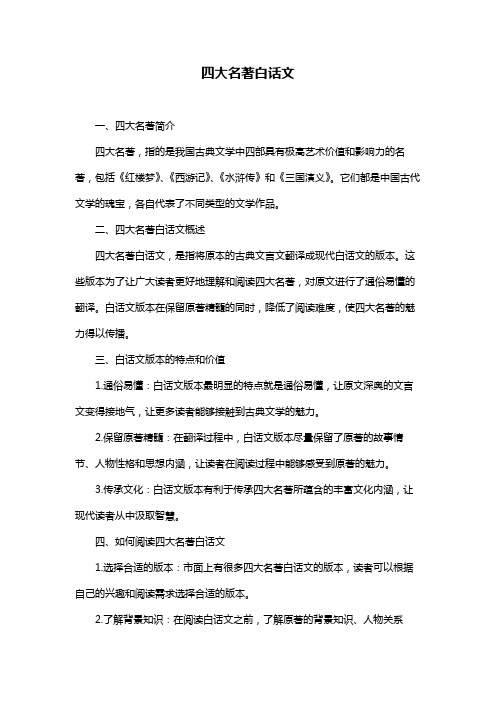
四大名著白话文一、四大名著简介四大名著,指的是我国古典文学中四部具有极高艺术价值和影响力的名著,包括《红楼梦》、《西游记》、《水浒传》和《三国演义》。
它们都是中国古代文学的瑰宝,各自代表了不同类型的文学作品。
二、四大名著白话文概述四大名著白话文,是指将原本的古典文言文翻译成现代白话文的版本。
这些版本为了让广大读者更好地理解和阅读四大名著,对原文进行了通俗易懂的翻译。
白话文版本在保留原著精髓的同时,降低了阅读难度,使四大名著的魅力得以传播。
三、白话文版本的特点和价值1.通俗易懂:白话文版本最明显的特点就是通俗易懂,让原文深奥的文言文变得接地气,让更多读者能够接触到古典文学的魅力。
2.保留原著精髓:在翻译过程中,白话文版本尽量保留了原著的故事情节、人物性格和思想内涵,让读者在阅读过程中能够感受到原著的魅力。
3.传承文化:白话文版本有利于传承四大名著所蕴含的丰富文化内涵,让现代读者从中汲取智慧。
四、如何阅读四大名著白话文1.选择合适的版本:市面上有很多四大名著白话文的版本,读者可以根据自己的兴趣和阅读需求选择合适的版本。
2.了解背景知识:在阅读白话文之前,了解原著的背景知识、人物关系等,有助于更好地理解故事情节。
3.细读品味:阅读白话文时,要细细品味文字背后的韵味,体会原著的思想内涵。
4.对比原文:有兴趣的读者可以尝试阅读原著,对比白话文版本,感受古典文学的魅力。
五、推荐版本及总结在这里,推荐人民文学出版社的四大名著白话文版本,它们的翻译质量较高,深受读者喜爱。
阅读四大名著白话文,不仅能让你领略到古典文学的魅力,还能让你在轻松愉快的阅读过程中,汲取智慧,丰富人生。
外国人翻译中国名著 只能说太有才了!!
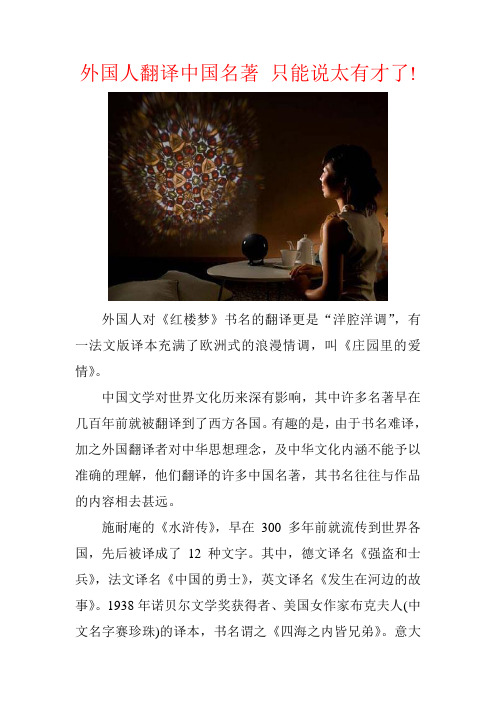
外国人翻译中国名著 只能说太有才了!外国人对《红楼梦》书名的翻译更是“洋腔洋调” ,有 一法文版译本充满了欧洲式的浪漫情调,叫《庄园里的爱 情》 。
中国文学对世界文化历来深有影响,其中许多名著早在 几百年前就被翻译到了西方各国。
有趣的是, 由于书名难译, 加之外国翻译者对中华思想理念,及中华文化内涵不能予以 准确的理解,他们翻译的许多中国名著,其书名往往与作品 的内容相去甚远。
施耐庵的《水浒传》 ,早在 300 多年前就流传到世界各 国,先后被译成了 12 种文字。
其中,德文译名《强盗和士 兵》 ,法文译名《中国的勇士》 ,英文译名《发生在河边的故 事》 。
1938 年诺贝尔文学奖获得者、美国女作家布克夫人(中 文名字赛珍珠)的译本,书名谓之《四海之内皆兄弟》 。
意大利人安德拉斯节译《水浒传》中鲁智深的故事,书名《佛节 记》 。
德国人节译杨雄的故事,取名《圣洁的爱》 ;节译武大 郎与潘金莲的故事,取名《卖大饼的武大郎和不忠实的妇 人》 ;节译智取生辰纲的故事,则取名《强盗设置的圈套》 。
如果说前面翻译的《水浒传》书名和内容多少还沾点边 的话,罗贯中《三国演义》书名的翻译,就很不可思议了。
有位美国翻译家翻译的《三国演义》 ,书名竟然叫《战神》 。
《水浒传》被翻译成多种语言。
英文版通常将《水浒传》 翻译成 Water Margin 或 Outlaws of the Marsh。
在众多译本中, 最早的当属赛珍珠女士在 1920 年代中后期翻译的 All Men Are Brothers(四海之内皆兄弟)。
书名出自 《论语》 “四海之内, 皆兄弟也”。
1933 年出版,是《水浒传》的第一个英文全译 本,当时在美国颇为畅销。
但是译本中有很多错误。
比如书 名的翻译,就不符合原意,受到过鲁迅先生的批评。
对一百 零八将的绰号,也往往望文生义,比如将病尉迟的(Yuchi) 译作"Weichi",将花和尚鲁智深译为 Priest Hwa(花牧师) , 更是将母夜叉孙二娘译为"Night Ogre"(夜间的怪物) 。
中国古典名著翻译

Chinese English(一)春秋时代《诗经》The Book of Songs《尚书》Classic of History; The Book of Documents《礼记》The Book of Rites 《易经》The Book of Changes 《春秋》Spring and Autumn Annals 《乐》The Classic of Music《论语》The Analects of Confucius The Analects《孟子》Mencius《大学》The Great Learning 《中庸》The Doctrine of the Mean《左传》Zuo Zhuan ;Chronicle of Zuo;Commentary of Zuo;Zuo Tradition (二)战国时代《老子》(又名《道德经》)The Tao Te Ching;Daodejing;Dao De Jing《列子》Liezi《愚公移山》Fiaith will move mountains; How Yukong Moved Mountains《庄子》The Zhuangzi 《荀子》The Xun-Zi 《韩非子》The Hanfeizi《吕氏春秋》The Lüshi Chunqiu ;Mister Lv's Spring and Autumn Annals ;Lv's Spring and Autumn ;《离骚》 Encountering Sorrow ; Encountering Trouble 《战国策》 Strategies of the Warring States《孙子兵法》The Art of War(三)两汉《过秦论》 Ten Crimes of Qin; The Faults of Qin 《鸿门宴》 White Vengeance 《毛遂自荐》Mao Sui Recommends Himself;Recommend oneself for a position as Mao Sui Did 《史记》The Records of the Grand Historian ( Shi Ji)Historical Records《资治通鉴》Partial Draft of the Comprehensive Mirror to Aidin Government; The Zizhi Tongjian 《汉书》The Book of Han;Hanshu;History of the Former Han 《后汉书》The Book of Later Han;Hou Hanshu; History of the Later Han《三国志》 Records of the Three Kingdoms《陌上桑》Mulberry By Road; The Roadside Mulberry 《长歌行》Singing All Along; A slow Song《十五从军征》The Old Soldier's Return《孔雀东南飞》A Pair of Peacocks Southeast Fly; The Peacocks Fly to the South and the East《上邪》The Pledge(四)三国两晋南北朝《短歌行》Short Song Style;A short Song《观沧海》The Sea《七步诗》The Quatrain of Seven Steps; Written While Taking Seven《洛神赋》The Goddess of the Luo 《出师表》Memorial on Going to War 《搜神记》Sou Shen Ji《桃花源记》The Peach Blossom Spring; The Peach Blossom Land; Peach Blossom Spring Story《归去来兮辞》Home-going-and-coming Song《归园田居》Returning to My Farm;Return to Nature《饮酒》Drinking Wine《世说新语》A New Account of the Tales of the World;Essays and Criticism《木兰诗》The Ballad of Mulan; The Mulan Ballad;Song of Mulan《乐府诗集》A Collection of Yue Fu Poetry;Yuefu Poetry(五)元《窦娥冤》The Injustice to Dou E;Snow in Summer《西厢记》The Romance of the Western Bower; The Story of the Western Wing (Wang Shifu)《赵氏孤儿》Zhao the Orphan;《天净沙·秋思》翁显良:Autumn; Schlepp: Tune to ”Sand and Sky”- AutumnThoughts;丁祖馨& Burton: Tune: Tian Jing Sha;许渊冲:Autumn Thoughts (六)明《忠义水游传》简称《水浒》Water Margin; Outlaws of the Marsh; All men are brothers《三国演义》Traditional Chinese;Simplified Chinese;The Romance of the Three Kingdoms《西游记》Journey to the West;Monkey King;Journey to the West Pilgrimage to the West;Story of the Journey to the West《金瓶梅》The Forbidden Legend Sex & Chopsticks;The Plum in the Golden Vase;The Golden Lotus;Chin P’ing Mei《牡丹亭》The Peony Pavilion《喻世明言》Clear Words to Illustrate the World;Stories to Enlighten Men《醒世恒言》lasting words to awaken the world;Stories to Awaken Men《警世通言》ordinary words to warn the world;Stories to Warn Men《初刻拍案惊奇》Amazing Tales-First Series; 《二刻拍案惊奇》Amazing Tales- Second Series(七)清《聊斋志异》Traditional Chinese; Strange Stories from a Chinese Studio《儒林外史》The Scholars (novel)《红楼梦》Dream of the Red Chamber;The Story of the Stone《己亥杂诗》Ji Hai Poem of Feeling《官场现形记》A Revelation of Official Circles Exposure of the Official WorldWhen you are old and grey and full of sleep, And nodding by the fire, take down this book, And slowly read, and dream of the soft look Your eyes had once, and of their shadows deep; How many loved your moments of glad grace, And loved your beauty with love false or true, But one man loved the pilgrim soul in you,And loved the sorrows of your changing face; And bending down beside the glowing bars, Murmur, a little sadly, how love fledAnd paced upon the mountains overheadAnd hid his face amid a crowd of stars.The furthest distance in the worldIs not between life and deathBut when I stand in front of youYet you don't know thatI love you.The furthest distance in the worldIs not when I stand in front of youYet you can't see my loveBut when undoubtedly knowing the love from both Yet cannot be together.The furthest distance in the worldIs not being apart while being in loveBut when I plainly cannot resist the yearningYet pretending you have never been in my heart.The furthest distance in the world Is not struggling against the tides But using one's indifferent heart To dig an uncrossable riverFor the one who loves you.。
四大名著翻译

《转载》四大名著的国外搞笑翻译一、《水浒传》英文版的题目有:《Outlaws of the Marsh》(沼泽里的歹徒),《All Men are Brothers——Blood of the Leopard》(四海之内皆兄弟——猎豹的血),《Water Margin》(水边)。
在法文中《水浒传》被译作《中国的勇士》或《沼泽地区的英雄们》,还有一个居然是《一百零五个男人和三个女人在山上的故事》;德文译名则有点牵强,如《强盗与士兵》。
另外还有一些节译本的名字更是耸人听闻,如德人节译潘金莲和武大郎的章节成书,书名叫《卖大饼的武大郎和不忠实妇人的故事》,节译的“智取生辰纲”则起名《强盗设置的圈套》。
二、《三国演义》早年有位美国人从《三国演义》中整理出关羽的故事,节译成书名为《战神》;后来美国汉学家摩斯·罗伯斯将其英文全译本起名为《Romance of the Three Kingdoms》(三个王国间的罗曼蒂克);现在也有一些译本直接叫《Three Kingdoms》(三个王国)的。
三、《西游记》国外大多译作《Record of a Journey to the West 》(西方旅行的记录)、《Journey to the West》(西行之旅)、《Story of the Journey to the West》(西游故事);另外还有人把孙悟空当作书名,如《Monkey》(猴子)、《The Monkey King》(猴王)等等。
四、《红楼梦》《红楼梦》原本就有另外一个名字《石头记》,所以外国人翻译时,也就难免翻译出二种名字来,如:《The Story of the Stone》(石头的故事)、《A Dream of Red Mansions》(红色大楼里的梦)、《A Dream of Red Chamber》(红色房间里的梦)。
此外,还有张冠李戴的翻译,如《The Cowherd and the Weaving Girl》(牛郎和织女),这与原著可就大相径庭了。
红楼梦英译本对比翻译分析
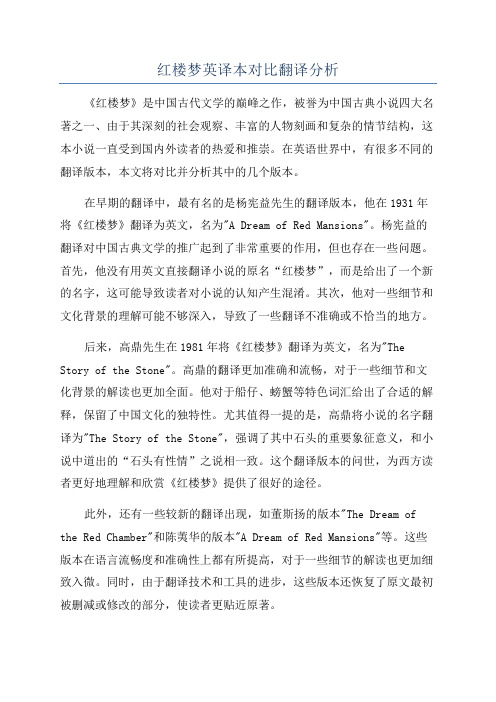
红楼梦英译本对比翻译分析《红楼梦》是中国古代文学的巅峰之作,被誉为中国古典小说四大名著之一、由于其深刻的社会观察、丰富的人物刻画和复杂的情节结构,这本小说一直受到国内外读者的热爱和推崇。
在英语世界中,有很多不同的翻译版本,本文将对比并分析其中的几个版本。
在早期的翻译中,最有名的是杨宪益先生的翻译版本,他在1931年将《红楼梦》翻译为英文,名为"A Dream of Red Mansions"。
杨宪益的翻译对中国古典文学的推广起到了非常重要的作用,但也存在一些问题。
首先,他没有用英文直接翻译小说的原名“红楼梦”,而是给出了一个新的名字,这可能导致读者对小说的认知产生混淆。
其次,他对一些细节和文化背景的理解可能不够深入,导致了一些翻译不准确或不恰当的地方。
后来,高鼎先生在1981年将《红楼梦》翻译为英文,名为"The Story of the Stone"。
高鼎的翻译更加准确和流畅,对于一些细节和文化背景的解读也更加全面。
他对于船仔、螃蟹等特色词汇给出了合适的解释,保留了中国文化的独特性。
尤其值得一提的是,高鼎将小说的名字翻译为"The Story of the Stone",强调了其中石头的重要象征意义,和小说中道出的“石头有性情”之说相一致。
这个翻译版本的问世,为西方读者更好地理解和欣赏《红楼梦》提供了很好的途径。
此外,还有一些较新的翻译出现,如董斯扬的版本"The Dream of the Red Chamber"和陈荑华的版本"A Dream of Red Mansions"等。
这些版本在语言流畅度和准确性上都有所提高,对于一些细节的解读也更加细致入微。
同时,由于翻译技术和工具的进步,这些版本还恢复了原文最初被删减或修改的部分,使读者更贴近原著。
总体而言,英译本中各个版本都有其独到之处和值得欣赏的地方。
《红楼梦》的翻译.
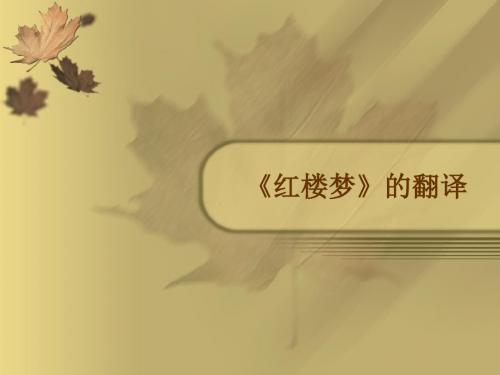
自著作品: 零墨新笺(随笔集)1947,中华书局 零墨新笺(随笔集)1950自印 赤眉军(中篇小说)1957,中国少年儿童出版社 译余偶拾(随笔集)1983,三联书店 翻译作品: 老残游记(长篇小说)1947,南京独立出版社 英国近代诗抄 1948,中华书局 离骚(楚辞)与戴乃迭合译,1953,外文出版社 屈原(话剧)与戴乃迭合译,1953,外文出版社 雪峰寓言 与戴乃迭合译,,1953,外文出版社 唐代传奇 与戴乃迭合译,1954,外文出版社 王贵与李香香(诗歌)与戴乃合译,1954,外文出版社 白毛女(歌剧)与戴乃迭合译,1954,外文出版社 长生殿(戏剧)与戴乃迭合译,,1955,外文出版社 鲁迅选集(1—4卷)与戴乃迭合译,1956,人文出版社
When false is taken for true, true becomes false; If non-being turns into being, being becomes non-being.
中国翻译协会9月17日在京举行仪式,授 予杨宪益“翻译文化终身成就奖”。至此, 这位著名的文学翻译家、外国文学研究专家, 成为继季羡林之后这一奖项的第二位得主。
《红楼梦》的外文版本
摘译本6种文字,17种版本 节译本12种文字,26种版本 全译本9种文字,19种版本 共17种文字,62种版本
《红楼梦》翻译概况
《红楼梦》英译简要 1830年 John Davis ,Chinese Poetry,第三回片段 1846年 Robert Tom,Dream of Red Chamber,第六回, 27页 1868年,E.C.Bowra,Dream of Red Chamber,前8回 1892年,Bencraft Joly,Dream of Red Chamber,第156回,单行本 1927年,王良志,Dream of Red Chamber,95章,60万 字,单行本 1929年,王际真,Dream of Red Chamber,39章,单行 本 1958年,Florence & Isabel Mchugh , The Dream of Red Chamber,节选本 1973年,霍克斯,David Hawkes,The story of the Stone,全译本 1978年,戴乃迭 杨宪益,A Dream of Red Mansions,全 译本
水浒传引首翻译

水浒传引首翻译
(实用版)
目录
1.《水浒传》的概述
2.《水浒传》引首的翻译及其意义
3.对《水浒传》引首翻译的评价
正文
《水浒传》是我国古典四大名著之一,讲述了宋江领导的 108 位好汉在梁山起义、抗击官府腐败的故事。
其中,《水浒传》的引首,即开头部分,对于整部作品的主题和风格起着至关重要的作用。
《水浒传》的引首部分,原文为:“试看书林隐处,几多俊逸儒流。
虚名薄利不关愁,裁冰剪雪,谈笑看吴钩。
”这一段文字,通过描绘书林中的隐士形象,突显了《水浒传》中的英雄好汉们不拘小节、豁达大度的性格特征。
同时,引首中的“虚名薄利不关愁”一句,也表达了这些英雄好汉对于世俗名利的淡泊态度。
然而,在翻译《水浒传》引首时,需要注意其背后的文化内涵和历史背景。
例如,其中的“吴钩”,指的是吴国地区的钩镰刀,是中国古代的一种兵器。
在翻译时,应尽可能保留其原有的象征意义,避免简单的字面翻译导致意义流失。
对于《水浒传》引首翻译的评价,总体上应该说是成功的。
翻译者在忠于原文的基础上,尽可能地传达了原文的意境和风格。
然而,也存在一些不足之处,例如对于一些具有深厚文化底蕴的词汇,翻译者未能做到充分传达其内涵,导致翻译的效果略有遗憾。
总的来说,《水浒传》引首的翻译,为我们提供了一个理解和欣赏这部古典名著的窗口。
- 1、下载文档前请自行甄别文档内容的完整性,平台不提供额外的编辑、内容补充、找答案等附加服务。
- 2、"仅部分预览"的文档,不可在线预览部分如存在完整性等问题,可反馈申请退款(可完整预览的文档不适用该条件!)。
- 3、如文档侵犯您的权益,请联系客服反馈,我们会尽快为您处理(人工客服工作时间:9:00-18:30)。
Chinese English
(一)春秋时代
《诗经》The Book of Songs
《尚书》
Classic of History; The Book of Documents
《礼记》The Book of Rites 《易经》The Book of Changes 《春秋》Spring and Autumn Annals 《乐》The Classic of Music
《论语》The Analects of Confucius The Analects
《孟子》Mencius
《大学》The Great Learning 《中庸》The Doctrine of the Mean
《左传》
Zuo Zhuan ;
Chronicle of Zuo;
Commentary of Zuo;
Zuo Tradition (二)战国时代
《老子》(又名《道德经》)The Tao Te Ching;
Daodejing;
Dao De Jing
《列子》Liezi
《愚公移山》
Fiaith will move mountains; How Yukong Moved Mountains
《庄子》The Zhuangzi 《荀子》The Xun-Zi 《韩非子》The Hanfeizi
《吕氏春秋》
The Lüshi Chunqiu;
Mister Lv's Spring and Autumn Annals;
Lv's Spring and Autumn;
《离骚》Encountering Sorrow ; Encountering Trouble
《战国策》Strategies of the Warring States 《孙子兵法》The Art of War
(三)两汉
《过秦论》Ten Crimes of Qin; The Faults of Qin
《鸿门宴》White Vengeance
《毛遂自荐》
Mao Sui Recommends Himself; Recommend oneself for a position as Mao Sui Did
《史记》The Records of the Grand Historian ( Shi Ji)
Historical Records
《资治通鉴》Partial Draft of the Comprehensive Mirror to Aid
in Government;
The Zizhi Tongjian
《汉书》
The Book of Han;
Hanshu; History of the Former Han
《后汉书》The Book of Later Han;
Hou Hanshu; History of the Later Han
《三国志》Records of the Three Kingdoms
《陌上桑》
Mulberry By Road; The Roadside Mulberry
《长歌行》Singing All Along;
A slow Song
《十五从军征》The Old Soldier's Return
《孔雀东南飞》
A Pair of Peacocks Southeast Fly; The Peacocks Fly to the South and the East
《上邪》The Pledge
(四)三国两晋南北朝
《短歌行》Short Song Style;
A short Song
《观沧海》The Sea
《七步诗》The Quatrain of Seven Steps; Written While Taking Seven
《洛神赋》The Goddess of the Luo 《出师表》Memorial on Going to War 《搜神记》Sou Shen Ji
《桃花源记》The Peach Blossom Spring; The Peach Blossom Land; Peach Blossom Spring Story
《归去来兮辞》Home-going-and-coming Song
《归园田居》Returning to My Farm;
Return to Nature
《饮酒》Drinking Wine
《世说新语》A New Account of the Tales of the World;
Essays and Criticism
《木兰诗》The Ballad of Mulan; The Mulan Ballad;
Song of Mulan
《乐府诗集》A Collection of Yue Fu Poetry;
Yuefu Poetry
(五)元
《窦娥冤》The Injustice to Dou E;
Snow in Summer
《西厢记》
The Romance of the Western Bower; The Story of the Western Wing (Wang Shifu)
《赵氏孤儿》Zhao the Orphan;
《天净沙·秋思》
翁显良:Autumn; Schlepp: Tune to ”Sand and Sky”- Autumn
Thoughts;
丁祖馨& Burton: Tune: Tian Jing Sha;
许渊冲:Autumn Thoughts (六)明
《忠义水游传》简称《水浒》
Water Margin; Outlaws of the Marsh; All men are brothers
《三国演义》
Traditional Chinese;
Simplified Chinese;
The Romance of the Three Kingdoms
《西游记》
Journey to the West;
Monkey King;
Journey to the West Pilgrimage to the West;
Story of the Journey to the West
《金瓶梅》The Forbidden Legend Sex & Chopsticks;
The Plum in the Golden Vase;
The Golden Lotus;
Chin P’ing Mei
《牡丹亭》The Peony Pavilion
《喻世明言》
Clear Words to Illustrate the World;
Stories to Enlighten Men
《醒世恒言》lasting words to awaken the world;
Stories to Awaken Men
《警世通言》ordinary words to warn the world;
Stories to Warn Men
《初刻拍案惊奇》Amazing Tales-First Series; 《二刻拍案惊奇》Amazing Tales- Second Series
(七)清
《聊斋志异》
Traditional Chinese; Strange Stories from a Chinese Studio
《儒林外史》The Scholars (novel)
《红楼梦》Dream of the Red Chamber;
The Story of the Stone
《己亥杂诗》Ji Hai Poem of Feeling
《官场现形记》A Revelation of Official Circles Exposure of the Official World。
